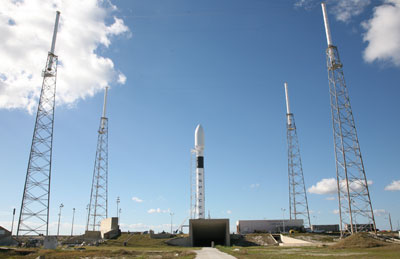Will NASA’s embrace kill NewSpace?by Taylor Dinerman
|
| If the Moon program could be described as belonging to the 20th century, the NewSpace industry is beginning to look as if they belong to the 18th century. |
The resentment aimed at SEI is nothing compared to what the NewSpace industry now faces on Capitol Hill. The cancellation of the Constellation program proposed in the 2011 budget is facing a bipartisan firestorm in Congress. It is doubtful that the President will want to make a special effort to support the new NASA program. His threat to veto the 2010 defense budget if it included money for the alternative F-35 engine turned out to be empty. The thousands of jobs and the irreplaceable expertise that this new plan throws away are far more important to the members of Congress, especially in the current economic climate, than are the arguments and promises from the new team at NASA.
In spite of its flaws—and if anyone says there is such a thing as a flawless government program ask them what they’ve been smoking—Constellation balanced the technological, political, and legal realities of today’s government environment. The new program is the product of a philosophy that, while it may be promising in the very long term, is simply not ready for prime time.
If the Moon program could be described as belonging to the 20th century, the NewSpace industry is beginning to look as if they belong to the 18th century. Like French courtiers wandering the halls of Versailles looking for a favor from the King, individuals who used to be regarded as brave entrepreneurs will now haunt the corridors of power looking for a subsidy or an earmark. They will prove their technical expertise by writing proposals that are perfectly adapted to the prevailing bureaucratic winds. It may be good business, but it does not have much to do with 21st century market capitalism.
Now that the NewSpace industry is in a direct fight with the powerful members of Congress they may find that in spite of support from NASA’s leadership, they lack the political strength overcome the opposition. If the men and women who sit on the appropriations committees feel their interests and even their political survival are threatened, they will strike back, and strike back hard. Some firms that have no government contracts will be immune to this backlash, but others, particularly the small and medium-sized ones that depend on SBIRs, will be vulnerable to the appropriators’ scalpel.
The poster child for NewSpace, SpaceX, which once had a number of military launch deals, may find them harder to come by at least in the near future. Since the USAF switched the TacSat missions away from the Hawthorne, California, firm, probably due to the delay’s involved with Falcon, it is hard to see them giving the company more business until it has a much better track record than it does now. It will also be fairly easy to paint NewSpace CEOs as “rent seekers”. Elon Musk’s ability at another company, Tesla, to collect government subsidies for selling very expensive luxury cars to millionaires should raise more than a few eyebrows.
| Spending a few billion on “technology development” programs is not going to do anything to spread human civilization into the solar system. |
The claim that one type of government contractor represents “free enterprise” and another group somehow represents “big government” is ludicrous. It’s all taxpayers money; the only difference is that the big aerospace firms long ago paid back (or lost) the money their founders invested in them. The Obama Administration’s attempt to buy off the opposition by spreading around $50 million in contracts under the Commercial Crew Development (CCDev) program is as transparent as their effort to defuse opposition to their health care bill by offering goodies to the insurance and pharmaceutical industries. Giving a few million to everyone from the giant ULA to the tiny Sierra Nevada may seem like a smart move, but it will do nothing to stop the broad public recognition that abandoning the Moon mission is a humiliating national defeat.
The president’s political foes will not let this pass. The bitterness and anger that so many Americans feel over the end (or the proposed end) of Moon program will only grow. This fall, as the final shuttle flights take place and the mid-term elections loom, they will pull out all the stops. In some places the rhetoric will get white hot. Constellation was an all-too-rare US Government program with deep bipartisan support. Throwing it on the ash heap is a sign of just how little this administration really values the idea of working across party lines.
Democrats who want to differentiate themselves from the president on an important symbolic issue will reject NASA’s new direction. Republicans will emphasize the death of a uniquely American vision. If the administration now tries to subordinate the US civil space program to an international collective of some sort, it will simply reinforce the perception that Barack Obama is a “post-American” leader.
NASA’s leaders may say that they are committed to sending explorers beyond low Earth orbit, but since they are trying to kill the one program that was actually building systems capable of doing so, their credibility is, shall we say, imperfect. Spending a few billion on “technology development” programs is not going to do anything to spread human civilization into the solar system. No matter what they say, the Obama Administration is going nowhere in space.
